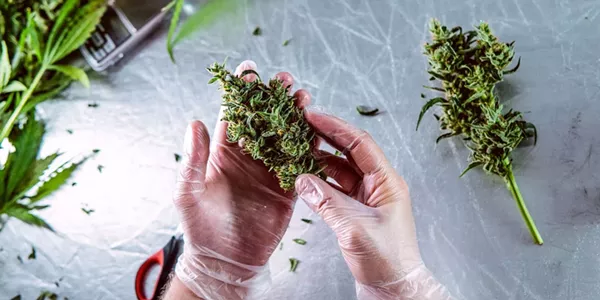Click to enlarge
CBD and CBG are gaining popularity for their unique combination of health benefits.
About 20 years ago, research into CBD and other therapeutic cannabinoids exploded when word got out that the Stanley brothers had accidentally discovered a potential treatment for “hippie disappointment.”
Supporting the cannabinoid CBG has quickly become an area of focus for scientists and hemp producers. Like CBD, CBG is non-psychoactive, and at the time, the market was ripe for even more injectable non-intoxicating drugs.
Both CBD and CBG are naturally occurring hemp cannabinoids. Cannabinoids bind to receptors built into the endocannabinoid system of all mammals, influencing mood, sleep, immunity, and more.
They are both natural anti-inflammatory agents and antioxidants, and CBD and CBG are commonly found in the exact same types of products.
After all, what's the big difference?
The answer lies in the scientific research on the two, how each is processed, and anecdotes about how CBD and CBG affect people differently.
First, there is now a significant increase in scientific research into the health benefits of CBD for humans. CBG research accounts for less than a third of the literature, and there are few robust human studies.
However, the first-ever human clinical trial of CBG was published this year, highlighting its powerful anxiolytic properties at doses as low as 20 mg.
As far as we know, research supports that CBG has the same positive effects on memory and learning as CBD. Both cannabinoids act as neuroprotectants and are often included in supplements for brain health.
After reviewing the available data, it appears that CBD and CBG offer nearly identical health benefits, with two notable exceptions: appetite and sleep.
Studies have shown that CBD oil acts as an appetite suppressant, and I've seen many marketing campaigns to that effect. Conversely, there is evidence that CBG acts as an appetite stimulant, paving the way for further research into treatments for weight dysregulation.
When it comes to sleep health, there is ample evidence that CBD is a non-addictive sleep aid, but not enough research has been done on CBG specifically targeting sleep. The only available scientific study examining the effects of CBG on sleep health in veterans showed no difference compared to a placebo. That said, CBG has anti-anxiety properties, so it may indirectly help improve your night's sleep.
Another point of differentiation is that there is proportionally more CBD than CBG naturally present in the hemp plant, making CBG more expensive to produce. The two are processed slightly differently, as CBG levels decrease as hemp plants mature, while CBD and THC levels increase.
Click to enlarge
Understand the difference between CBD and CBG and their combined effects on anxiety.
This happens because at a molecular level, CBG is a precursor to CBD, THC, and all other cannabinoids. In the biosynthetic process, CBGA, the acidic form of CBG, is first produced. Fittingly, we often see references to CBG as the “mother of all cannabinoids.”
However, I think the biggest reason why CBD and CBG are different is simply because people feel them differently.
CBD's reputation as an anxiety treatment is more established than CBG, but that's because, frankly, CBD has only been on the market for a while. However, more and more people are switching from CBD to CBG in search of a better anti-anxiety solution.
I myself have never taken CBG specifically for anxiety, so I can't speak to that. However, my brother, who previously took THC and CBD, now swears that CBG is the best antidote to underlying anxious feelings. He says that when using CBG, the anti-anxiety effects feel different and more effective than before, and that he actually feels more mentally alert than drowsy.
While reviewing all kinds of cannabinoid products, I noticed that users tend to take CBG during the day for energy and focus, and CBD at night for sleep. This may be organic, but manufacturers sell cannabinoids with those specific effects in mind.
Finally, B2C cannabinoid manufacturers are now offering products that feature CBD and CBG at the same time. Although there is no scientific evidence to support the strength of any particular combo other than pointing to a greater entourage effect, the internet has been abuzz with testimonials purporting to be this magical duo. Interestingly, many of the Reddit threads and dozens of verified testimonials I've read say that the anti-anxiety effects can be more pronounced when CBG is included.
The bottom line is that CBD and CBG offer nearly the same natural benefits, but CBD reduces appetite and CBG increases it. CBD has also been proven to be a powerful sleep aid, but there is a lack of evidence regarding CBG in this area.
Also, since cannabis plants contain more CBD than CBG, they are processed differently as CBG levels decrease as they mature.
Scientific studies aside, mounting anecdotal evidence suggests that CBD and CBG give people noticeably different sensations. Now, more and more people are claiming that the combination of CBD and CBG can help improve anxiety and mood.
Until more research on CBG reveals the magical CBD:CBG ratio in a particular strain or product, users will need to experiment on their own. The best advice to do so is to only buy from responsible vendors.
Do your research and make sure the manufacturer regularly performs third-party lab tests. It is also beneficial to look for CBD and CBG products made from domestically grown hemp, preferably organic operations.
From there, it's all about the journey.

